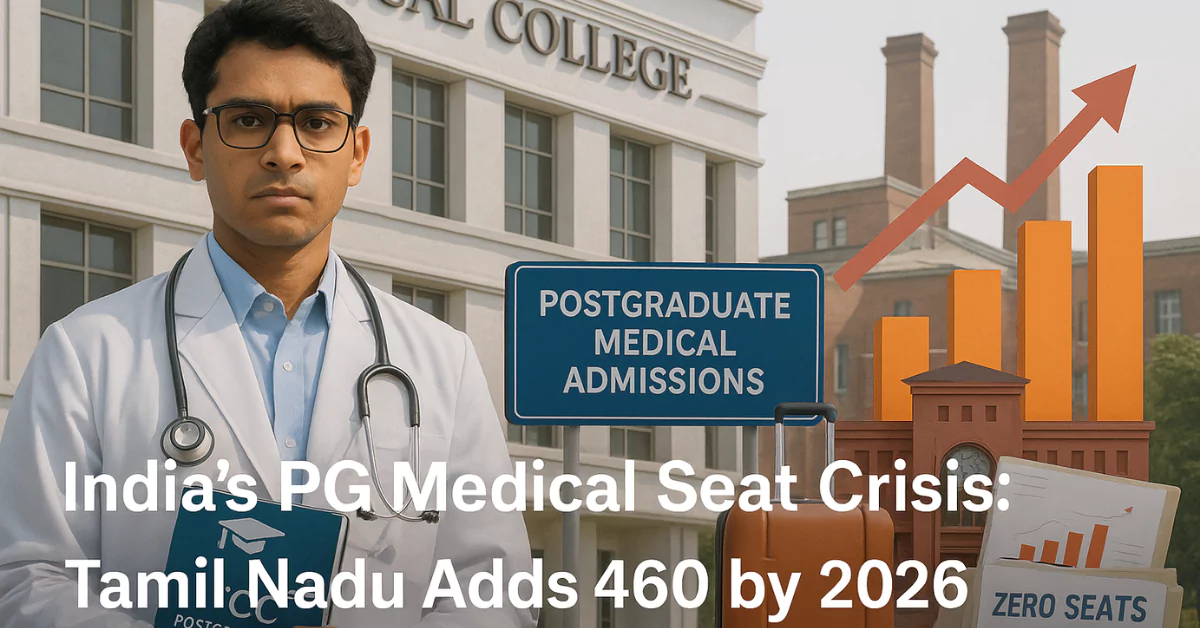Every year, more than 1 lakh MBBS graduates graduate from medical colleges across India, but only around 73,000 PG medical seats are available nationwide. This creates a huge gap: thousands of qualified doctors are left without PG, unable to specialise or advance their careers.
In this context, Tamil Nadu’s announcement to add 460 new postgraduate (PG) medical seats by 2026–27 is both timely and essential. It reflects not just a state initiative, but a broader national need for structural expansion in medical education.
Why India Needs More PG Medical Seats?
The Problem: PG Medical Seats Shortage Hurts Healthcare
Demand-Supply Mismatch
- India currently has over 1,18,000 MBBS seats (as of 2025).
- However, the PG seats (MD/MS/DNB) remain at approximately 73K.
- This means only 2 out of every 3 MBBS graduates get a PG seat in India.
What Happens Without a PG Seat?
- Doctors are stuck in career stagnation.
- Rural and district hospitals are left with general practitioners when specialists are urgently needed.
- Many doctors either repeat NEET PG for years, go abroad, or leave clinical practice altogether.
FMGE & PG Returnees Add More Pressure
Foreign medical graduates who pass FMGE also enter this already tight PG race, intensifying competition.
TN to Add 460 by 2026
Tamil Nadu’s Initiative
460 PG Medical Seats to Be Added
Earlier, we reported on 20 July that Tamil Nadu plans to add 460 PG Medical Seats in 13 government medical colleges by 2026–27.
Medical Colleges to Receive New PG Seats:
- Madras Medical College, Chennai
- Kilpauk Medical College, Chennai
- Stanley Medical College, Chennai
- Coimbatore Medical College
- Thanjavur Medical College
- Kanyakumari Government Medical College
- Others affiliated with Tamil Nadu Dr. M.G.R. Medical University (TNMGRMU)
Infrastructure Support:
- Expansion of clinical departments
- Enhanced faculty recruitment and equipment upgrade
- All under National Medical Commission (NMC) approval and inspection
Why Tamil Nadu’s Decision Matters Nationally
More NEET-PG Opportunities
With increased government PG seats, more NEET-PG qualifiers will secure MD/MS seats without exorbitant private college fees.
Better Specialist Coverage in Rural Areas
Graduates from government PG programs often serve in district hospitals. More PG seats mean:
- More surgeons, physicians, OBGYNs, paediatricians, and anaesthetists
- Better healthcare delivery in tier-3 cities and villages
Reduced Migration to Other States/Abroad
Doctors from Tamil Nadu often travel to states like Karnataka, Andhra Pradesh, or even abroad (Russia, Georgia) for PG seats. Increased local capacity will retain talent.
Support for Public Health Infrastructure
With 404 government hospitals, 1,776 dispensaries, and 11,030 health centres, Tamil Nadu has infrastructure ready, but needs specialists to lead them.
How Other States Are Acting on Issues
| State | Recent PG Seat Expansions |
|---|---|
| Maharashtra | Added 500+ PG seats in the past 2 years across GMCs in Pune, Nagpur |
| Karnataka | Opened new DNB programs in private and trust hospitals |
| UP & Bihar | Upgrading district hospitals to PG training institutes |
| Rajasthan | 400+ new PG seats in 5 years, focus on tier-3 medical colleges |
What Needs to Be Done Nationally
Expand DNB and Diploma Programs
- National Board of Examinations (NBE) can offer PG training through private hospitals and district centres.
Reduce Urban Bias
- Many PG seats are concentrated in metros. Rural and tier-2 colleges must be empowered with faculty and infrastructure.
Bonded PG Schemes
- Tamil Nadu and Maharashtra already mandate rural service after PG. This can be implemented nationwide with better incentives.
Ease Faculty Shortages
- Faculty-to-student ratio must comply with NMC norms. Centralised recruitment drives and contractual specialist hiring can help.
“The MBBS-PG seat gap in India is a structural problem. Tamil Nadu’s proactive push to expand PG education is a model other states must follow,” Said a senior doctor at a govt medical college in Chennai.
PG Expansion Is the Key to Improving Healthcare Delivery in India
Tamil Nadu’s plan to add 460 PG medical seats by 2026 is not just a state-level reform; it’s a blueprint for other states to follow. As healthcare needs grow, especially in post-COVID India, the demand for specialists will only intensify.
To ensure that every MBBS graduate has a fair chance to advance, and every Indian, whether in Chennai or Chhattisgarh, has access to quality care, India must urgently scale up its PG infrastructure.
More seats mean more specialists. More specialists mean better healthcare.

